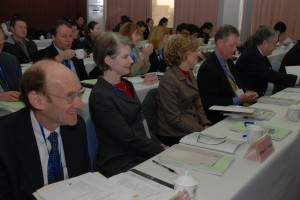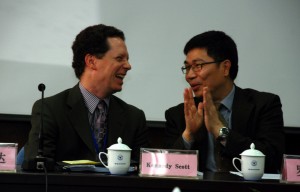U.S.-China Business Conference Cooperation

IU Kelley School faculty Bruce Jaffee, Trish McDougal and Idie Kesner listen to presenters during the opening session
In recent months, particularly during the 2010 election season, there has been much rhetoric and debate over China’s trade surplus and whether keeps it keeps its currency, the Yuan, too cheap, giving it an unfair trade advantage with the United States.
Many presenters at a conference hosted by Zhejiang University, Indiana University’s strategic partner in China, didn’t dodge the issues.
Beginning Monday (March 14), academics from both sides of the Pacific Ocean have had a great deal to say, but the dialogue has been reasoned and in a spirit of the event’s theme: “U.S.-China Business Cooperation in the 21st Century: U.S.-China Economic and Trade Relations after the Global Economic Crisis.”
Keynote speaker Professor Song Yuhua of the College of Economics at Zhejiang University observed that discussion over the issue goes back to the end of the 1990s, when global trade imbalances emerged as a hot topic.
“If the U.S. can no longer be the biggest global buyer, China may become the world’s leader in world product capacity,” she observed, adding that her country’s own growing demand for goods and services may be a reason for this.
She believes the U.S. Dollar is still an important reserve currency worldwide, but that the Euro and China’s RMB “also are expanding their spheres and will also take their seats.”
Following Song was Scott Kennedy, an IU professor and director of the other conference organizer, IU’s Research Center on Chinese Politics and Business, who says the situation is best understood in the context of the global “rules of the game.”
“Where the rules are clear, the competition is contained and healthy. Where the rules are unclear, the competition is highly stressful, politicized and vulnerable to spin out of control,” he said. “Fundamentally reducing U.S.‐China economic tensions requires fixing the global rules.”
With regard to some trade issues, such as questions over whether the two countries are imposing antidumping and anti-subsidy duties on their imports and who controls technical standards in high-tech areas, it may be true that the Chinese are learning the rules of the game.
In other areas, such as with regard to currency and mergers and acquisition activities and commodities trading, the rules are less clear for everyone.
Kennedy regularly writes a blog, the China Track, which is recommended reading for anyone in these issues, and frequently is interviewed by journalists for his perspective.
Other IU faculty members have presented papers on related issues at the conference, including: Mohan Tatikonda, associate professor of operations management and the L. Leslie and Mary Louise Waters Faculty Fellow in the Kelley School of Business at Indianapolis, who presented a paper on product innovation in China’s potentially economically vibrant Pearl River Delta region; and Jeffrey Hart, professor of political science in the College of Arts and Science, who took a second look at the flat panel display industry in China and its emergence as a major producer worldwide.
In the afternoon, it seemed only appropriate that the discussion turned to how the media is impacting people’s views of trade and economic issues in both countries. Perhaps of greatest interest to everyone were new research findings by IU journalism professors Lars Willnat and Emily Metzgar on American’s attitudes about China.
Their new national survey of Americans finds that many U.S. citizens believe that China’s economy is overtaking the United States’ in terms of size and influence. However, they also found that a vast majority (82 percent) of those surveyed have a favorable view of the Chinese people.
A news release was issued in the U.S. and China on the day of the conference and can be found online at the IU News Room site. If you like you can read it online in Simplified Chinese or in Traditional Chinese.
Other presenters included Wu Fei, dean of the School of Media and Communications at Zhejiang University, and two other Chinese scholars. Greg Andrews, managing editor of the Indianapolis Business Journal, spoke about his publication and its growing interest in China because of its increased activities with Indiana. Chris Fyall, a reporter at the Bloomington Herald-Times served as a discussant.
And then there was George Vlahakis, manager of media relations at IU (yes me), who gave a presentation about how his colleagues in IU’s University Communications Office skillfully work with many professors who have a world view on many issues.
For example, did you realize that about one-fifth of IU’s tenure track faculty were born outside the United States? IU faculty attend about 1,400 international conferences like this one each year, and more than 80 languages are taught at IU Bloomington.
We continue to use news releases, work with reporters doing stories and explore many new avenues presented by social media to include IU faculty in the international discussion.
And we write newsletters and blogs, like this one, which I hope you are enjoying.
1 Comment
Sorry, the comment form is closed at this time.



China has an impressive growth and GDP figures but the bubble must burst. Many observers are saying this could be sooner than expected.
Comment by Jane Wheeler on March 21, 2011 1:46 pm